Notícias
RACIAL EQUALITY
Brazilian Government presented policies for combating racism during the UN Permanent Forum on People of African Descent

Minister Anielle Franco had meetings with representatives from the governments of the United States and Colombia, in an effort to strengthen historical bonds and cooperation among the countries - Photo: Lucas Castor
The participation of the Brazilian Government, represented by the Ministry of Racial Equality (MIR) at the 3rd session of the UN Permanent Forum on People of African Descent in Geneva, Switzerland, amplified the work of Brazil for the promotion of guarantees of the rights of the Brazilian Black population.
Aiming to share the initiatives and policies regarding cooperation and to set the agenda for international agreements to combat racism multilaterally, the Minister of Racial Equality, Anielle Franco, participated in meetings with representatives from the governments of the United States and Colombia, in an effort to strengthen historical bonds and cooperation among the countries.
“For me, it is an honor to be at the front line, as my people have been in the recent past. The Brazilian government has been building this effort to recognize, respect, and value the Afrodiasporic identities in Brazil and around the world. This is what we work for, and we will keep on fighting”
ANIELLE FRANCO
Minister of Racial Equality
Last Tuesday (16), Anielle Franco met with the United Nations Deputy High Commissioner for Human Rights, Nada Al-Nashif, to whom she presented the racial equality agenda developed by the MIR over the past year, with a special mention to the Black Youth Alive program (Programa Juventude Negra Viva). The Minister pointed out the possibility of Brazil hosting a session of the Human Rights Forum. She was gifted with a version of the handbook ‘How to effectively implement the right to participate in public affairs: A spotlight on people of African descent'.
The second meeting of the day was with the United States representative for racial equality and justice, Desirée Cormier Smith. They discussed the resumption of the Joint Action Plan between Brazil and the United States to Eliminate Racial and Ethnic Discrimination and Promote Equality (JAPER), the importance and legitimacy of civil society, historic reparation, and other issues faced by Brazil in combating violence targeting the Black population.
According to the Minister, these bilateral encounters establish a horizontal cooperation mechanism to implement social, economic, and political aspects to ensure that the Black community can access these rights. “For me, it is an honor to be at the front line, as my people have been in the recent past. The Brazilian government has been building this effort to recognize, respect, and value the Afrodiasporic identities in Brazil and around the world. This is what we work for, and we will keep on fighting”, Franco declared.
The extensive agenda closed with a meeting with Ana Margarita González, Manager of Ethnic and Racial Justice from the Vice-Presidency of Colombia, to discuss the challenges faced by the Afrodescendant populations in Latin America, and how the two countries can continue to work together.
UNIQUE PLATFORM - As part of the Brazilian delegation at the 3rd session of the UN Permanent Forum on People of African Descent, the Secretary of Policies for Combating and Overcoming Racism (SEPAR/MIR), Márcia Lima, emphasized that the Forum is a unique platform for showcasing the main initiatives of MIR aimed at combating racism and implementing affirmative actions, whether in the public service or higher education. "Our commitment to building robust public policies and expanding the guarantee of rights for the Black population can serve as a reference for countries engaged in the agenda of racial equality," she stated.
ACTIONS BY MIR – In his address at the panel on 'Reparation, Economic Justice, and Sustainability,' Yuri Silva, the Director of Anti-Racism Policies at MIR, outlined the scope of the ministry's actions aimed at promoting and valuing the history and memory of Afro-Brazilian culture. He also highlighted institutional efforts to halt violence against young black individuals, traditional peoples of African-derived religions, black women, and black communities.
He highlighted policies such as the Black Youth Alive program, one of the most important policies for the preservation of the lives of young black Brazilians; the Federal Program of Affirmative Actions (Programa Federal de Ações Afirmativas - PFAA) for the promotion of rights, opportunities; affirmative actions for the black community, the quilombolas, indigenous communities, persons with disabilities, and women; and the actions to safeguard and promote the Archeological Site of the Valongo Port (Cais do Valongo), among others.
“I want to recall that Afrodescendants around the world continue to be strongly affected by the inequalities generated by the legacy of slavery and colonialism which have been revived daily by structural and systemic racism. Reparation means guaranteeing the material, financial, and economic conditions, but also the subjective conditions that our people need to live in plenitude in the world”, stated Silva.
The Ministry of Racial Equality has been working on actions to propose and recognize the need for special measures in favor of the victims of racism, xenophobia, racial discrimination, and correlated intolerances, as foreseen in the Durban Declaration.